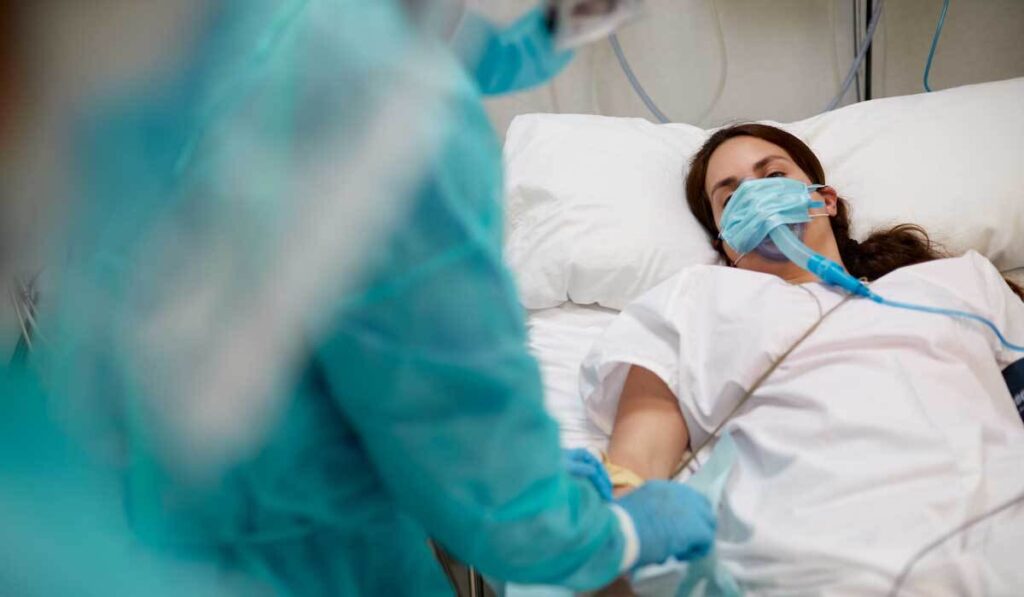In early 2020, clinical trial data showed that the current SARS-CoV-2 mRNA vaccine effectiveness worked in preventing infections and severe illness from COVID-19 in the clinical trial setting. Now, an ongoing, multicenter study led by Vanderbilt University Medical Center and supported by the CDC has released its latest data on vaccine effectiveness in preventing severe disease and hospitalization from COVID-19 in a large population.
Data from the study are sent to the CDC every two weeks to help inform those creating U.S. vaccination policies.
The study’s principal investigator is Wesley Self, M.D., vice president for Clinical Research Networks and Strategy in the Vanderbilt Institute for Clinical and Translational Research (VICTR). Self and colleagues are using a previously established network of 21 hospitals across the U.S. – the Influenza and Other Viruses in the Acutely Ill (IVY) Network – to track COVID-19 hospitalizations.
Discoveries recently sat down with Self to discuss the study’s early findings.
A Network for COVID-19 Research
Discoveries: How did Vanderbilt get involved with this critical research?
Self: In 2018, I was approached by the CDC, who has been evaluating the effectiveness of vaccines for many decades. Their surveillance work had largely been looking in outpatient settings to see if there were breakthrough infections despite vaccination. The hole in that approach was that there may be attenuation of disease severity from vaccines.
This is an important concept because one of the main drivers of flu vaccine hesitancy is, “I’ve gotten the flu shot before and I still got the flu.” For people with flu vaccine hesitancy, the data-driven answer is, “That may be true, but we think you would have been much sicker had you not gotten the vaccine.”
Flu is complicated because each year the virus is different, and the vaccines are different. Even in patients where the influenza vaccine does not prevent illness, our research found that those who get the influenza vaccine likely get less severe disease.
Young People and Vaccine Effectiveness
Discoveries: Is that true across the population, or just for specific groups?
Self: We know that flu vaccines prevent severe disease in older people. The data aren’t perfect, but we think it’s true for younger people, too. In influenza, there is a very distinct phenomenon of young, healthy people in the prime of their life getting sick and dying. This is rare, but not incredibly rare. Our motivator was to find out if these young people should get vaccinated to prevent their being infected with influenza.
This is similar to what we’re finding out about COVID-19 in this latest surge of hospitalizations. It’s pretty clear that the people who are showing up in the hospitals now have not been vaccinated. They also tend to be younger, but those are typically the people who don’t get vaccinated.
Pivot to SARS-CoV-2
Discoveries: So, you diverted the work of the IVY network from flu to COVID-19? How do you collect the data?
Self: The way we attacked the question with flu was to do a series of case-controlled studies. We went out to 21 hospitals across the country and enrolled their sickest influenza patients – people in the ICU – and determined if they were vaccinated. Then, we established a control population of patients who are in the ICU for other reasons besides flu and determined if they were vaccinated. Mathematically, we could figure out how effective the vaccine was in preventing hospitalization.
Since we had this network and approach established, it was a natural fit to move into the SARS-CoV-2 space. As soon as COVID-19 hit, we began looking at research questions surrounding COVID-19 data. We work closely with the CDC to devise the questions and work with them to get data out to the public quickly. We’ve been enrolling since November 2020, trying to get to basically all the ill COVID-19 patients at our 21 hospitals – thousands of patients.
Assessing mRNA Vaccine Effectiveness
Discoveries: What data have you collected so far?
Self: Early in the pandemic, we were looking at things like mask use to reduce transmission, how many health care workers were getting COVID-19, and what their antibody response was like. We learned a lot. For instance, some of our early data showed that visiting restaurants was highly associated with getting COVID-19. That wasn’t super popular, as you’ll remember.
Since the introduction of the vaccines in late 2020 for health care workers and for the general public in early 2021, we’ve been studying how effective the vaccines are in preventing severe disease from COVID-19. The answer is that the mRNA vaccines – Pfizer and Moderna – are really good at preventing severe disease. That’s what 90 percent of people in the U.S. are getting, so that’s what we’ve been able to study. We’ll look at others as more data become available.
Vaccine Demographics
Discoveries: What groups have you studied?
Self: The earliest analysis we could do was in patients 65 years and older, because they were the first group to be vaccinated after the health care workers. Again, we looked at the question, “How good are these vaccinations at preventing severe disease and hospitalization?”
Using data from early Spring 2021, we found that in people over 65, the mRNA vaccines prevented 94 percent of hospitalizations. Then, the vaccine availability spread. Recently, we’ve been looking at all vaccinated adults 18 and older using data from March through May. What we found is that the vaccines are 87 percent effective at preventing overall hospitalizations – that’s fantastic!
One caveat is that those in the immunocompromised population don’t mount the same immune response. There, we found about 60 percent effectiveness. That’s pretty good; good enough to say they should be vaccinated despite the risks. Of course, there are certain patients who shouldn’t be vaccinated. Now we’re looking at what else can we offer them.
Waning Protection and Breakthrough Cases
Discoveries: What about decreasing protection and breakthrough cases? What are you finding?
Self: The two questions we’re asking now are “How long does this immune status last?” and “Will you be protected from the new variants?” In our early data (through June), we’re finding no evidence that we can detect that protection from the vaccines is waning – the risk of getting severe disease and being hospitalized is the same as it was in the weeks after vaccination.
As for breakthrough cases, the natural question is why? One answer is that they did not mount an antibody response. So, we’re testing the antibodies of these patients through blood samples and other immune status data; we will soon start testing their T cells.
The second thing that can happen, as we all know now, is that the virus can mutate, and new variants may not have the same susceptibility to the vaccine. The mRNA vaccines appear to provide protection against the Delta variant, but Lambda’s already out there. We will be looking at that over time.
Informing Recommendations
Discoveries: Will we need booster shots?
Self: We will continue to collect data from the hospitals in our network regarding hospitalized patients. These data will determine if there is waning effectiveness that may require a booster with the same vaccines. A booster against a new variant may require a new formulation for the specific variant.
Clearly, right now, vaccinating everyone is priority number one. Priority number two is making the current vaccines better and protecting people who aren’t mounting a strong immune response.
Discoveries: Thank you for your time. Any closing thoughts?
Self: It is an honor to have been selected by the CDC to do this important work of evaluating SARS-CoV-2 vaccine effectiveness and we will continue to work with them to disseminate information. I am incredibly proud of our Vanderbilt team, which has been leading the IVY Network for the past two years and has taken on the challenge of conducting clinical research during the pandemic.





